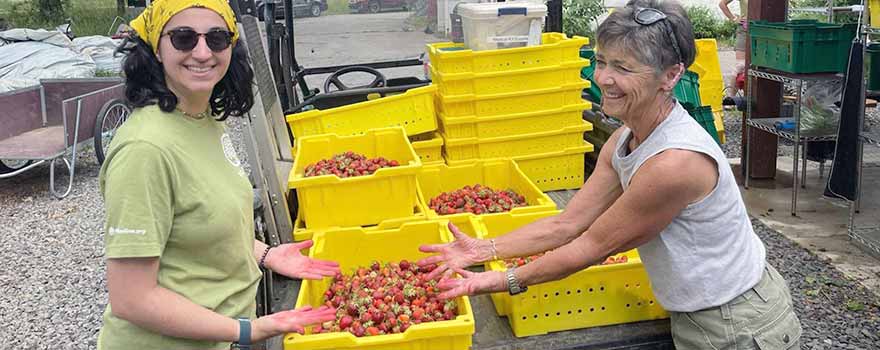Biologists explore the structure and functions of living things, from the individual cell to the whole organism and entire communities. Emerging breakthroughs in molecular biology, genetics, and stem cell science are rapidly advancing career opportunities. Students in Drexel’s Bachelor of Science (BS) in Biological Sciences degree program go on to work in medicine, healthcare, research and commercial laboratories, private and government agencies, academia, bioinformatics, forensics, genetic counseling, genomics, public health and policy, science journalism, and law.
From the beginning of their academic journey, Drexel Biological Sciences majors learn by doing. Students gain career-guiding experience by working alongside supportive faculty mentors at the forefront of scientific discovery in their fields. They join a collaborative community of faculty, graduate, and undergraduate scientists who work across disciplines to develop skills, share knowledge, and explore complex questions over a dynamic range of research areas.
Drexel’s BS in Biological Sciences curriculum provides the breadth of knowledge needed for a solid foundation, while allowing students flexibility to focus on their area of interest. Students choose from six concentrations designed to position them for in-demand jobs and to pursue graduate study. Students can enhance career-readiness through a variety of minor options and qualified undergraduates can pursue accelerated programs in medicine, biological sciences, epidemiology, and advanced therapeutics.
Through the renowned Drexel Co-op program, which partners with corporate, governmental, and non-governmental employers, Biological Sciences majors can explore a wide range of professional careers across many different sectors.
Visit Our Department
Concentrations
In addition to core degree requirements, Biological Sciences majors select one of six concentrations designed to prepare them for advancements in the field. Upon graduation, students receive a degree that identifies their concentration.
Cell/Molecular/Genetics/Biochemistry
The concentration in Cell/Molecular/Genetics/Biochemistry offers a strong foundation in the basic tenets of modern biology. It investigates the underlying theory behind advances in these disciplines in relation to basic science and medicine.
Organismal Biology/Physiology
The concentration in Organismal Biology/Physiology offers a foundation in the cellular or biochemical basis of physiologic events and the diversity of organismal forms, as well as an in-depth study of physiology. Students with interests in pre-health can specialize in human physiology and its application to health and disease.
Ecology/Evolution/Genomics
The concentration in Ecology/Evolution/Genomics focuses on the study of genes and genomes. It offers a deep understanding of ecology and evolution and how molecular and computational tools interact with these disciplines. Courses cover principles in ecology and evolution, techniques in molecular biology and genomics, and computational approaches for the analysis of DNA sequence data.
Pathobiology
The concentration in Pathobiology explores the underlying mechanisms of disease and students gain in-depth skills in pathogenesis. Courses offer a foundation in immunology and microbiology, an understanding of how microorganisms contribute to disease and how the body works to prevent disease and infection.
General Biology
The concentration in General Biology is for students who want flexibility to develop a unique path of study. Students may customize their program of study by selecting a variety of electives in three concentrations: Cell/Molecular/Genetics/Biochemistry, Organismal/Physiology, and Ecology/Evolution/Genomics.
Cell and Gene Therapy
Cell and gene therapy involves the use of cells or genes to treat diseases. This concentration is for students who want to gain an understanding of cell and gene therapy concepts from a biological and biomedical engineering perspective.
Accelerated Programs
Earn your advanced degree sooner — Drexel University's accelerated degree programs allow academically qualified undergraduate students to earn a bachelor's degree and a master's degree concurrently, allowing them to graduate sooner than they would in traditional advanced degree programs.
Minors
Biological Sciences majors can enhance career-readiness through minor programs designed to provide them with deeper understanding and the opportunity to develop more focused skills.

Photo: During their two co-ops with the Pennsylvania Horticultural Society, Bayanne Kakhia, BS biological sciences ’26, worked on educational and community-based programming, including school field trips and nutrition education.
Experiential Learning
One of the most valuable aspects of the ‘Drexel Experience’ in the Biology Department is the experiential, hands-on learning we provide for our majors. From their very first year, undergraduates gain from real-world situations and academic coursework where they develop essential, career-relevant skills in creativity, critical thinking, quantitative analysis and communication. Most importantly, these hands-on experiences shape each student’s perception of themselves and the world around them in ways that support their academic success and foster career growth. Drexel’s Bachelor of Science in Biological Sciences program offers a range of experiential opportunities, including the Drexel Co-Op, laboratory-focused courses such as Course-based Undergraduate Research Experiences (CUREs), study abroad programs, and extracurricular research experiences. Our world-class faculty encourage students to be active participants in their courses and take part in mentored research as members of research labs and teams.
Faculty Research Areas
Drexel Co-op
Through Drexel Co-op, Biological Sciences majors gain up to 18 months of on-the-job experience — exploring their career options, strengthening their résumés and building a professional network. This experience gives Biological Sciences majors a competitive edge as they pursue advanced degrees, or careers in academia and industry. Recent co-op employers include AstraZeneca, Children's Hospital of Philadelphia, Fox Chase Cancer Institute, GlaxoSmithKline, Moss Rehab, Philadelphia Horticultural Society, Spark Therapeutics, and ViroPharma.
Careers
Biological Sciences graduates work in many different fields across a wide range of employment sectors. They pursue careers in medicine, nursing, veterinary sciences, dentistry and other allied health professions. Many hold research positions in the private sector; become technicians in government and academic labs; or work as research scientists and professors in cancer biology, cell and molecular biology, neuroscience, immunology and forensic biology.
Other career paths include education, genetic counseling, clinical trials coordination, bioinformatics, genomics, clinical lab medicine, public health, policy, science journalism and law.
Get In Touch
Reach out to Drexel’s College of Arts and Sciences recruitment team at coas@drexel.edu with any questions. We look forward to hearing from you!

Janine Guerra
Director of Recruitment
Drexel University
College of Arts and Sciences

Autumn Ellis
Recruitment Specialist
Drexel University
College of Arts and Sciences